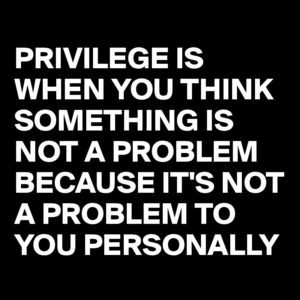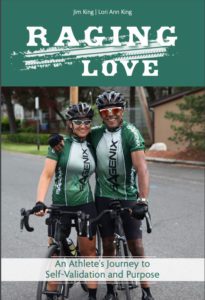
As a white woman in America, I have struggled to understand prejudice from a black perspective. I did not understand white privilege growing up in a predominantly white area. I had no experience or understanding of what the phrase “driving while black” meant.
Seeing it play out firsthand with someone I love was a deeply personal experience. It was eye-opening and heartbreaking. I found it to be both shocking and dehumanizing.
Until this point, my white privilege meant I never had to understand or witness the effects of systemic racism or experience the pain that my fellow humans feel. I didn’t understand the disproportionate risks for black travelers.
Observing it on the news, I saw it logically.
Witnessing it, the emotions tore at the very root of my soul and to this day, bring me to tears.
This post is not meant to be an attack on law enforcement. It is my perspective from my experience seeing the difference between being pulled over for black people vs. white people.
The cost of being pulled over
I heard the siren before I saw the flashing lights.
It was 1989. I was 18.
“Shit,” I said out loud.
I had been out with friends and was driving home.
It was late. Dark. Raining. I was lost.
Tears threatened to fall. All hopes of making curfew were gone.
I pulled to the side of the road. My thoughts and fears continued: Will I get a ticket? Will I have to appear in court? Will there be points on my license? Will my parent’s insurance go up? Will I be grounded? What are the repercussions of a minor traffic violation?
What will this cost?
It was 2009. I was 38.
We had been out with friends and were driving home. Jim and I had been dating for a little over a year. He was driving my car.
It was late. Dark. Foggy.
The fog was so dense you could not see the side of the road. Jim did his best to navigate an unfamiliar area in low visibility. He drove close to the only thing he could see, the center yellow line. I did my best not to panic.
We heard the siren before we saw the flashing lights.
“Shit,” we said in unison.
Jim pulled the car to the side of the road. My mind raced ahead with fear: Will he get a ticket? Will he have to appear in court? Will there be points on his license? Will his insurance go up?
What will this cost?
Jim’s words interrupted my frantic thoughts, “Just stay calm. Stay quiet. Don’t make any sudden movements. Put your hands on the dash.”
“What?” I said.
“Just do it,” Jim said.
I did what he told me, confused. Jim was calm, but something was wrong. Normally strong and confident, he seemed uneasy, unsure.
 He rolled down his window and put his hands across the steering wheel. I observed his eyes as he watched, first in the rearview mirror, then the side mirror.
He rolled down his window and put his hands across the steering wheel. I observed his eyes as he watched, first in the rearview mirror, then the side mirror.
“Hello, Officer,” he said, as the man in uniform reached his window.
“License and registration, please,” the officer said.
“Yes, Sir. Both are in my bag in the back seat. May I turn and get it?”
“Yes,” said the officer.
“Okay. I’m slowly turning into the back seat to get my bag.”
Jim detailed every single movement as I watched. My hands trembled. I was mesmerized at the dynamic between these two men, each desperately trying to find a place of trust.
“My bag is on my lap. I need to unzip it and reach inside. May I do that, Sir?” asked Jim.
A bright light shined into our car, first in our eyes, then on the bag in my boyfriend’s lap. “Proceed,” he said.
Jim took a breath and went back to narrating his every move. “I’m unzipping my bag. I’m opening it wide,” he said as he opened the bag to the officer’s view.
The officer leaned in, one hand on the long steel Maglight, the other on his sidearm.
“I’m reaching inside to get my wallet. That’s where my license is,” continued Jim, waiting for the officer to nod before moving.
Jim raised his left hand in the air, where the officer could see it. With his other hand, he pulled out his wallet. “I’m going to open my wallet now, Sir. I need two hands,” he said as he looked up at the officer for permission.
The cop nodded in agreement. Jim slowly opened his wallet, reached inside, and found his license, insurance, and copy of my registration. He offered the documents to the officer.
“I’ll be back,” said the officer.
Jim turned toward the front of the car and placed his hands on the steering wheel. His head dropped.
“What the he–?” I started to say, but he cut me off.
“Stop. Don’t speak,” Jim said quietly. “I’m just trying to get out of this alive.”
Awareness kicked in, along with something new. This was fear like I’d never known.
A white officer. A black man. A white woman.
A dark, foggy street late
at night.
I was no longer worried about the possibility of a ticket, court appearance, or fine.
I was afraid for his life.
What will this cost?
Later that night, Jim described one of the many times he had been pulled over, driving while black.
It was 1990. He was 38.
He had been out with friends and was driving home.
It was late. Dark. He was driving within the speed limit when he passed a police car.
He saw the flashing lights before he heard the siren.
He pulled the car to the side of the road and rolled down the window.
The officer approached and said: “Get out of the car.”
Jim did as he was told.
The officer pulled out his revolver and pointed it at him.
Jim tapped his finger on the roof.
“License and registration,” the officer growled, still pointing his gun at him.
Jim continued tapping on the roof of the car.
The officer said, “What are you doing?”
Jim’s girlfriend, previously sleeping in the passenger seat, suddenly sat upright. The officer stepped backward, startled, and slid his revolver back into its holster.
“License and registration,” he said.
Jim stood with his legs spread and his hands wide, like a big X, facing the officer, fearful that any sudden wrong move could get him shot. “My license and registration are in my wallet in my back pocket. May I retrieve them?” he asked.
The officer nodded, his eyes darting between Jim and his girlfriend.
Jim raised both hands as he narrated every slow, intentional move. “I’m going to turn around. I’m reaching my right hand toward my back pocket, and you can still see my left hand. I’m pulling out my wallet. I’m turning back around to face you.”
As Jim turned back to face the officer, the officer’s hand never left his revolver.
“I’m going to use both hands to open my wallet and pull out my license and registration.” As he did so, he stretched out his arm to hand them to the officer. The officer took one glance and then said, “Get out of here.”
“Why did you
stop me?” Jim asked.
The officer repeated louder, “Get out of here.”
“Don’t I have a right to know why you stopped me?” Jim asked.
“Get in your car and get the hell out of here,” the officer said through gritted teeth, his hand still on his revolver.
Jim climbed back in the vehicle and drove away.
Hurt. Humiliated. He was so angry he began to cry.
He was exhausted from working so hard to control his emotions and not give the officer any reason to shoot him.
And grateful to be alive when so many men and women of color are killed driving while black.
Jim owned a brand-new car. He had a six-figure income in upper management at a Fortune 500 company. Yet he was disrespected and treated like a low-life thug.
Demeaning. Demoralizing. Dehumanizing.
A white officer. A
black man. A white woman.
A dark street late at night.
What did this cost?
________________________________________________________________________
Driving while black can be found on Wikipedia: “It implies that a motorist may be stopped by a police officer largely because of racial bias rather than any apparent violation of traffic law.[1] It is a word play of ” [2] The phrase “driving while black” has been used in both the public and private discourse relating to the racial profiling of black motorists.”
Source: en.wikipedia.org
According to the ACLU, racial profiling results in more stops of minority drivers, specifically for black people. It undermines the confidence in law enforcement.
The black experience for American drivers is very different from my own. But one I now have more compassion and anger for.
Juneteenth (officially Juneteenth National Independence Day) is a federal holiday in the United States commemorating the emancipation of enslaved African Americans. (Source: en.wikipedia.org) #juneteenth
Additional reading:
Articles from my blog – The Tough Stuff:
- Focusing and Channeling Anger to Succeed in Sports and Love
- The Beauty of Mothering
- Gifts of the Season
- Freedom. Fighting for what you believe in
- Ask for Consent. Hold out for Enthusiasm.
Buy Now:
 Raging Love: Far more than a sports memoir, Raging Love is a gripping tale of perseverance and purpose and a reminder that finding one’s path is, above all, an evolution from psychological discipline and mental toughness to forgiveness, spiritual peace, self-knowledge, and self-love.
Raging Love: Far more than a sports memoir, Raging Love is a gripping tale of perseverance and purpose and a reminder that finding one’s path is, above all, an evolution from psychological discipline and mental toughness to forgiveness, spiritual peace, self-knowledge, and self-love.
In this book, King tells how he learned to focus his anger and channel it in a more positive direction to finally understand that athletic success does not always bring fulfillment, but rather forgiveness and mentoring others can help a person to evolve, find love, quality relationships, and live a more balanced life of purpose.
Raging Love is a must-read source of inspiration for everyone. Even non-sports fans will cheer for King as he wrestles his rage, learns to forgive, and turns his focus to the love and service of others.
When you buy direct from my publisher, you get a discount and I receive a higher royalty. 🙂 When completing your purchase, use coupon code KING at checkout to receive 10% off.
Buy Raging Love


